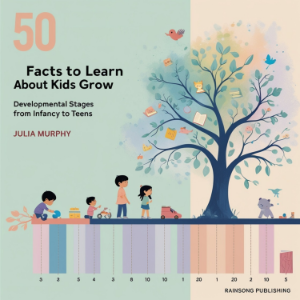

50 Facts to Learn About How Kids Grow
Julia Murphy
This audiobook is narrated by a digital voice.
Unlock the amazing journey of childhood with 50 Facts to Learn About How Kids Grow—a clear, friendly guide to the physical, emotional, and social development of children from infancy through the tween years.
Perfect for parents, caregivers, educators, and anyone curious about how kids change and grow, this book breaks down complex developmental milestones into easy-to-understand facts. Learn how babies develop motor skills, how preschoolers build friendships, how school-age kids start thinking logically, and how tweens explore identity and independence.
Each fact is packed with practical parenting tips, real-life examples, and encouraging insights—making it a go-to resource for nurturing confident, happy, and resilient children at every stage.
Whether you’re a first-time parent or a seasoned caregiver, this guide will help you understand your child’s world and support their growth with love and knowledge.
Duration - 1h 43m.
Author - Julia Murphy.
Narrator - Digital Voice Padma G.
Published Date - Monday, 06 January 2025.
Copyright - © 2025 RainSong Publishing ©.
Location:
United States
Description:
This audiobook is narrated by a digital voice. Unlock the amazing journey of childhood with 50 Facts to Learn About How Kids Grow—a clear, friendly guide to the physical, emotional, and social development of children from infancy through the tween years. Perfect for parents, caregivers, educators, and anyone curious about how kids change and grow, this book breaks down complex developmental milestones into easy-to-understand facts. Learn how babies develop motor skills, how preschoolers build friendships, how school-age kids start thinking logically, and how tweens explore identity and independence. Each fact is packed with practical parenting tips, real-life examples, and encouraging insights—making it a go-to resource for nurturing confident, happy, and resilient children at every stage. Whether you’re a first-time parent or a seasoned caregiver, this guide will help you understand your child’s world and support their growth with love and knowledge. Duration - 1h 43m. Author - Julia Murphy. Narrator - Digital Voice Padma G. Published Date - Monday, 06 January 2025. Copyright - © 2025 RainSong Publishing ©.
Language:
English
Opening Credit
Duration:00:00:19
Introduction
Duration:00:01:14
Section 1: Infancy (0–1 Year)
Duration:00:00:08
Fact #1: Babies Are Born with More Bones Than Adults
Duration:00:01:27
Fact #2: A Baby’s Brain Doubles in Size in the First Year
Duration:00:01:26
Fact #3: Attachment Forms the Foundation for Lifelong Relationships
Duration:00:01:41
Fact #4: Babies Learn Through Their Senses Before Words
Duration:00:03:30
Fact #5: Tummy Time Helps Build Motor Skills
Duration:00:03:25
Fact #6: Babies Begin to Recognize Faces by 2–3 Months
Duration:00:01:58
Fact #7: Crying Is a Baby’s First Communication Tool
Duration:00:01:55
Fact #8: Sleep Cycles Are Different in Infants Than Adults
Duration:00:02:05
Fact #9: Babies Can Mimic Facial Expressions Early On
Duration:00:01:52
Fact #10: Emotional Regulation Begins with Caregiver Response
Duration:00:02:13
Section 2: Toddlerhood (1–3 Years)
Duration:00:00:08
Fact #11: Toddlers Go Through a Vocabulary Explosion
Duration:00:01:58
Fact #12: Saying "No!" is a big part of growing up.
Duration:00:01:54
Fact #13: Temper Tantrums Are Linked to Emotional Growth
Duration:00:02:10
Fact #14: Toddlers Learn Through Imitation
Duration:00:02:12
Fact #15: Separation Anxiety Is Normal and Temporary
Duration:00:02:17
Fact #16: Potty Training Readiness Varies Widely
Duration:00:02:07
Fact #17: Repetition Helps Toddlers Learn and Feel Safe
Duration:00:02:02
Fact #18: Parallel Play Builds Social Skills
Duration:00:01:49
Fact #19: Toddlers Thrive on Predictable Routines
Duration:00:01:59
Fact #20: Language Explodes in the Toddler Years
Duration:00:02:06
Section 3: Preschool Years (3–5 years)
Duration:00:00:04
Fact #21: Imagination Becomes a Powerful Learning Tool
Duration:00:01:56
Fact #22: Preschoolers Start Asking Big “Why” Questions
Duration:00:01:55
Fact #23: Emotional Outbursts Are Normal (and Temporary)
Duration:00:01:56
Fact #24: Preschoolers Begin to Understand Rules and Fairness
Duration:00:01:56
Fact #25: Preschool Friendships Start to Take Root
Duration:00:01:46
Fact #26: Preschoolers Start to Develop a Sense of Identity
Duration:00:01:56
Fact #27: Preschoolers Begin to Grasp Time and Sequence
Duration:00:01:54
Fact #28: Preschoolers Love to Ask and Explore “What If?”
Duration:00:02:03
Fact #29: Language Skills Grow by Leaps and Bounds
Duration:00:02:08
Fact #30: Imagination Becomes a Powerful Learning Tool
Duration:00:01:56
Section 4: Middle Childhood (6–11 years)
Duration:00:00:04
Fact #31: Kids Begin to Understand Rules—and Why They Matter
Duration:00:02:04
Fact #32: Friendships Become More Meaningful and Emotionally Important
Duration:00:02:05
Fact #33: Reading and Writing Open New Worlds of Learning
Duration:00:01:56
Fact #34: Emotional Control and Coping Skills Start Taking Shape
Duration:00:02:01
Fact #35: Kids Start to Form a Stronger Sense of Identity
Duration:00:01:49
Fact #36: Logical Thinking Begins to Take Off
Duration:00:02:05
Fact #37: Self-Evaluation and Comparison with Others Begin
Duration:00:02:03
Fact #38: Play Starts to Include Rules, Strategy, and Teamwork
Duration:00:01:54
Fact #39: Friendships Become Deeper and More Meaningful
Duration:00:02:02
Fact #40: Learning Differences May Become More Noticeable
Duration:00:02:07
Section 5: Adolescence (12–18 years)
Duration:00:00:04
Fact #41: The Tween Years Begin (Ages 9–12)
Duration:00:02:03
Fact #42: Abstract Thinking Starts to Develop
Duration:00:02:01
Fact #43: Identity Exploration Begins
Duration:00:01:57
Fact #44: Emotional Sensitivity Increases
Duration:00:02:01
Fact #45: Peer Approval Becomes Very Important
Duration:00:01:53
Fact #46: Puberty Often Begins Quietly
Duration:00:02:01
Fact #47: Body Image Becomes a Big Deal
Duration:00:01:48
Fact #48: Tweens Want More Privacy and Independence
Duration:00:01:48
Fact #49: Tweens’ Sleep Needs Remain High
Duration:00:01:43
Fact #50: Growing Together—Parents and Kids in the Tween Years
Duration:00:01:59
Closing Credit
Duration:00:00:14